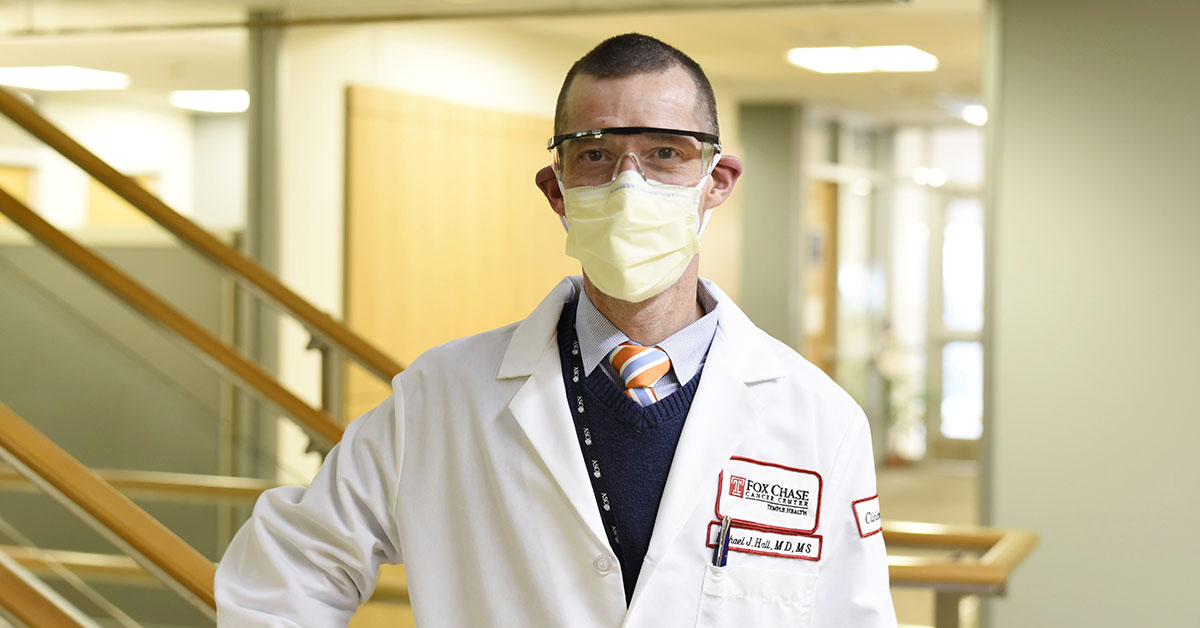
PHILADELPHIA (MARCH 30, 2021)—There’s more and more evidence that genes associated with one type of cancer may increase risk for other cancers as well. Now a study by Fox Chase Cancer Center scientists quantifies new risks for pancreatic, prostate, gastric, and other cancer in a gene previously linked to breast cancer.
The research also shows that the location of a genetic mutation plays a role in cancer risk and that people whose mutations occur in certain “hot spots” on the gene are at higher risk than others.
“We undertook this study wanting to more broadly explore what kind of cancers might be a risk in people who carry mutations in this commonly mutated gene,” said Michael J. Hall, MD, MS, chair of the Department of Clinical Genetics at Fox Chase.
The study, “Germline Pathogenic Variants in the Ataxia Telangiectasia Mutated (ATM) Gene are Associated With High and Moderate Risks for Multiple Cancers,” was published in Cancer Prevention Research, a journal of the American Association for Cancer Research.
The study looked at variants, or mutations, in the ataxia telangiectasia mutated (ATM) gene, a gene that has long been identified for its association with a moderate increased risk for breast cancer. It included data from more than 627,000 patients who had previously undergone genetic testing. Of the group, 4,607 patients were found to have an ATM mutation.
The study found that around 0.35% of people carry an ATM mutation—still a significant number, but lower than the 1% to 2% of the population previously thought.
Previous research has suggested that the variant may also be linked to pancreatic cancer. With such a large data set, the new study was able to better quantify those risks and also expand the understanding of the strength of association between mutations in ATM and cancers of the prostate, stomach, and ovary.
Researchers found a four-fold increase in risk for pancreatic cancer, a three-fold increase for stomach cancer, and a two- to three-fold increase for prostate, and confirmed the previously known two-fold invasive ductal breast cancer in patients with an ATM mutation. They also found a low-to-moderate increase in risk for male breast cancer, ovarian cancer, colorectal cancer, and melanoma.
The findings could help shape cancer screening guidelines for people who have an ATM mutation. “Currently, we have limited guidelines that tell us how we should be screening patients who are carriers of an ATM mutation,” Hall said, “but I think the size of the risks we saw here for prostate, pancreas, and stomach cancer would raise the question about whether expanded screening should be considered.”
In addition to the findings about other cancers, the study identified “hot spots” that increase cancer risk. ATM is a large gene, with many thousands of locations on the gene where a mutation can occur. One common mutation in particular, known as c.7271T>G, was associated with a significantly higher risk of breast cancer (nearly four-fold) than the other ATM mutations. “There is clearly a variability in the risk of breast cancer based on where the mutation occurs in the gene,” Hall said.
One potential limitation to the findings is that around 90% of the study data came from women—an indication of the fact that women are more likely than men to pursue genetic testing. “We still had a fair number of men in the study—over 20,000, and we stand by our estimates of the prostate cancer risks,” Hall said.
Hall hopes to follow up on this research by taking a closer look at the risks associated with other “hot spot” mutations in the ATM gene, as well as examining how inherited ATM mutations correlated with ATM mutations found in tumor tissue. He also plans to expand his research beyond the ATM gene. “We’re very interested in looking at similar questions in other genes that are being tested these days,” he said.